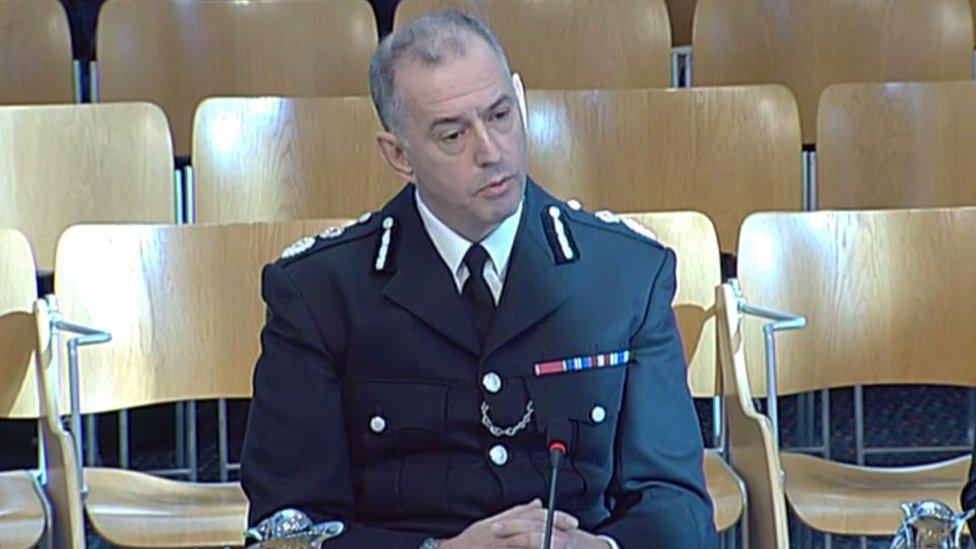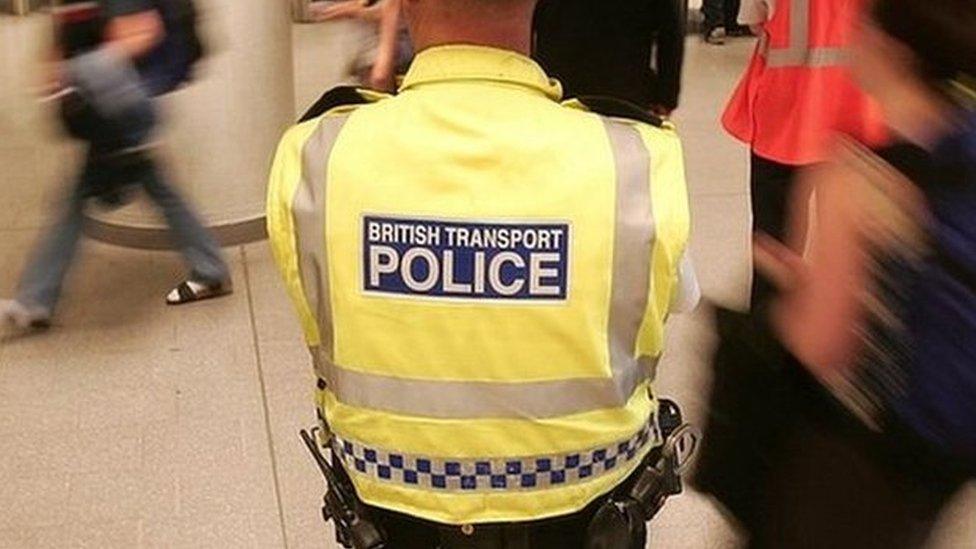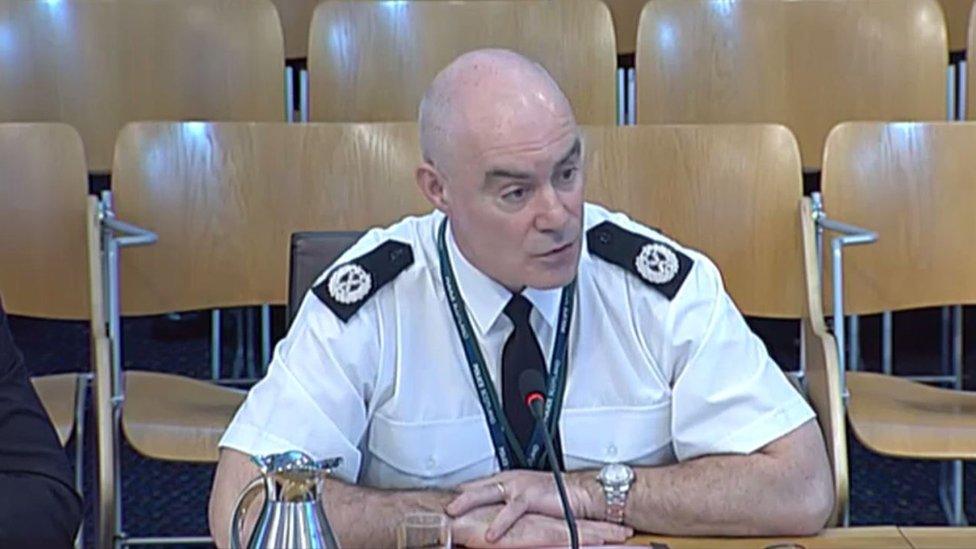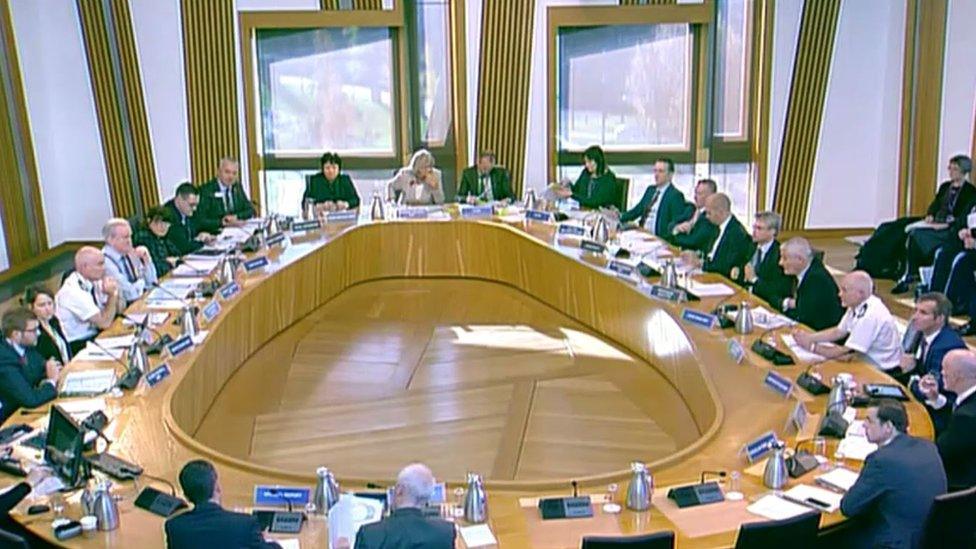BTP chief warns of Police Scotland merger skills loss
- Published

BTP Chief Constable Paul Crowther told MSPs there might be a "real challenge" replacing senior staff
The chief constable of British Transport Police has warned plans for a merger with Police Scotland could lead to a loss of specialist skills.
Paul Crowther told Holyrood's justice committee of a "real challenge" in replacing officers amid a "significant outflow of expertise".
He told MSPs of the bomb threats, fatalities and near-death incidents officers often have to deal with.
Police Scotland has called the merger plan "complex but not insurmountable".
Holyrood is currently considering a bill which would pave the way to absorbing the functions of the British Transport Police (BTP) into Police Scotland north of the border by April 2019.
The Scottish government has long wanted to integrate the service into Police Scotland, seeing it as the most "efficient and effective" way of delivering policing across the country.
The Railway Policing (Scotland) Bill, external confers extra policing powers on the Scottish Police Authority and the Police Service of Scotland, but further legislation would be needed at Holyrood and Westminster to transfer staff, properties and cross-border policing functions.
'Substantially different'
Mr Crowther told the justice committee that that railway policing is "substantially different" to that undertaken in geographic forces.
He noted that BTP officers dealt with "25 to 30 bomb threats a month" due to abandoned baggage, and hundreds of incidents where people are either "restrained from jumping or removed from the tracks, in close proximity to death". Some officers could deal with 12 to 15 fatalities each per year, he added.

Merging the functions of BTP with Police Scotland has been a long-standing goal for the Scottish government
The committee has received written evidence from BTP officers warning of a "dilution" of skills, with some officers choosing to transfer to other areas or forces rather than join Police Scotland.
Noting that several experienced senior staff are due to retire in the two years leading up to the proposed merger, Mr Crowther said it might potentially be difficult to replace them in a non-specialist force like Police Scotland.
He said: "There is an interesting and significant outflow of expertise and transport policing ethos, and that then needs to be replenished.
"It's replenished in an organisation that has that as its sole focus. I think it would be a real challenge to replenish that in an organisation whose focus is in many other areas of policing rather than transport policing."
'Bespoke' unit
Police Scotland's Assistant Chief Constable Bernard Higgins acknowledged there was a "risk that the skill base will be diluted", but added that "it's my job to make sure that doesn't happen".
He said railway training will eventually form part of the basic training for all Police Scotland officers, saying this would result in "17,000 officers with the skills to operate within the railway environment", alongside a smaller number with "bespoke" specialist skills.

ACC Bernard Higgins said having two years to integrate BTP into Police Scotland was "frankly a luxury"
Mr Higgins said that while officers could "potentially" be redeployed in the case of a major incident, there would "absolutely" be a specialist transport policing unit and those transferring in from BTP would have the right to remain policing only the railways until they retire.
Asked by Conservative MSP Douglas Ross if two years was enough time to carry out the merger, Mr Higgins said that was "frankly a luxury, based on what we've had to do previously".
Meanwhile, committee convener Margaret Mitchell pointed out that railway policing officers elsewhere in the UK are trained to carry tasers, while in Scotland only specialist firearms officers are armed with them.
Mr Higgins said he would have to "assess the threat within the wider rail network" to see if it was "appropriate" to continue to allow railway policing staff in Scotland to carry tasers after the merger, while finding "the best way to mitigate threat".
'Poorer quality'
The committee received written evidence from two, externalanonymous, external officers who both warned that some BTP staff will seek to transfer to other forces rather than move to Police Scotland.
One told the committee that some officers had already left for BTP units in England and Wales, while some in Scotland had left "due to the uncertainty over the proposed merger", as they "do not want to join Police Scotland for a variety of reasons".
These officers also said cross-border train services would "notice a poorer quality of service" and that "criminals that travel across the border could potentially be missed" due to the different BTP and Police Scotland computer systems.
The BTP submission, external also noted the "specialist approach" and "seamless" coverage across the border, which "avoids the need for officers to disembark" between Scotland and England.
Police Scotland's submission, external highlighted the intention to "retain the current specialist skills and knowledge built up by BTP officers to ensure a smooth transition into Police Scotland", adding a training programme would be developed to "upskill" current frontline Police Scotland officers.
The force added: "Devolution of railway policing will have no detrimental impact on cross-border security arrangements.
"BTP and Police Scotland currently work together on a number of cross-border operations and this close working relationship would be expected to continue with BTP colleagues south of the border, following April 2019."
- Published21 December 2016

- Published9 December 2016

- Published1 November 2016
